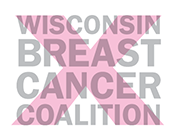State legislation often has a more personal impact on our day to day lives than federal legislation. The first step to being engaged in our state government is knowing who your representatives are. Click here and enter your address in the “Find My Legislators” box to find your state representatives. Remember – they are in Madison to represent YOUR best interests and your values, but they can’t do that without hearing from their constituents. It is always a good practice to thank your representatives when they support policy that is a important to you!
Current State Policy Issues
Breast screening legislation and continued advocacy for Wisconsin’s Well Woman Program have been selected as WBCC’s top state policy priorities. (click here to read more about WBCC’s federal priorities).
“Gail’s Law”: No Cost Supplemental Screenings and Diagnostic Tests
Our top state priority is legislation related to insurance coverage for high risk women who have been diagnosed with dense breasts, or have been told they are at high risk due to family history/genetics. Dense breast tissue not only makes tumors harder to see on mammograms, but is a risk factor – in and of itself – for developing breast cancer. (More detail on this here).
In 2017, Wisconsin joined many other states in passing legislation that required health care facilities to notify a woman, after her mammogram, if she has dense breast tissue. The mandated notification also encourages women to follow up with their health care professional to discuss risk and the potential need for further screening. These tests may include ultrasound or MRI.
Additionally, many women are called back after a screening mammogram to investigate something suspicious or unclear on her results. These follow-up tests, by further mammogram views, ultrasound or even MRI are considered “diagnostic” rather than “screening.”
Unfortunately, many insurers do not cover the cost of tests beyond the initial annual screening mammogram. If a woman cannot afford the cost of additional, necessary testing, she may choose to forgo it entirely. This increases her risk for an undetected cancer to spread and become lethal before her next annual mammogram.
Not covering additional, necessary tests causes a disparity in access to potentially lifesaving healthcare. Gail’s Law, named for our friend and colleague Gail Zeamer, will address that disparity and help find earlier, more treatable cancers that would have otherwise gone undetected. We lost Gail to metastatic breast cancer in June of 2024, but we are continuing the fight in her name.
HISTORY:
In the 2021 legislative session, the first iteration of this bill was introduced as Senate Bill 413 and Assembly Bill 416, however they did not advance to a vote and died when the legislature adjourned in March 2022.
In February 2023, Sen. Rachael Cabral-Guevara (R-Appleton) and Rep. Nate Gustafson (R-Neenah) held a press conference announcing a new bill.
Introduced in the State Senate with bipartisan support in March 2023, SB 121 / AB 117 had excellent bipartisan support already in the legislature and was also supported by a coalition of organizations including WBCC, Susan G Komen, American Cancer Society, Wisconsin Primary Health Care Association and more In late 2024, WBCC and our partners in the Early Detection Saves Lives Coalition ceased working for passage of the bill due to harmful amendments that had been added to it. The bill did not get on the schedule for a vote in either the Senate or the Assembly and so “died” once again. The silver lining though, is that a bad bill did not pass. This allows us to go back in this new session and continue to build support for a bill that reflects medical guidelines.
If you have been told you have dense breasts and have not been able to afford MRI or ultrasound screening, and if you are willing to share your story with YOUR state senator and assembly representative, you could help us! This is how the first bill came about in Wisconsin – an advocate, telling her story to her elected officials. Please contact us at admin@wibreastcancer.org if you would like to be involved.
Wisconsin Well Woman Program
The Wisconsin Well Woman Program (WWWP) is jointly funded by the state and the CDC, to provide free breast and cervical cancer screenings for women who are uninsured. The program is part of the congressionally directed Breast and Cervical Cancer Early Detection Program, established in 1990. It also includes a Medicaid Treatment component so that women diagnosed through the program can get enrolled in Medicaid to start treatment promptly.
Given current uncertainty about continued federal funding for health programs we hope to ensure the continuation of this vital program that provides a safety net for women so that they can continue cancer screenings and follow up. We are especially concerned at this time about the potential loss of federal Medicaid funding to treat women diagnosed through the Well Woman Program.
